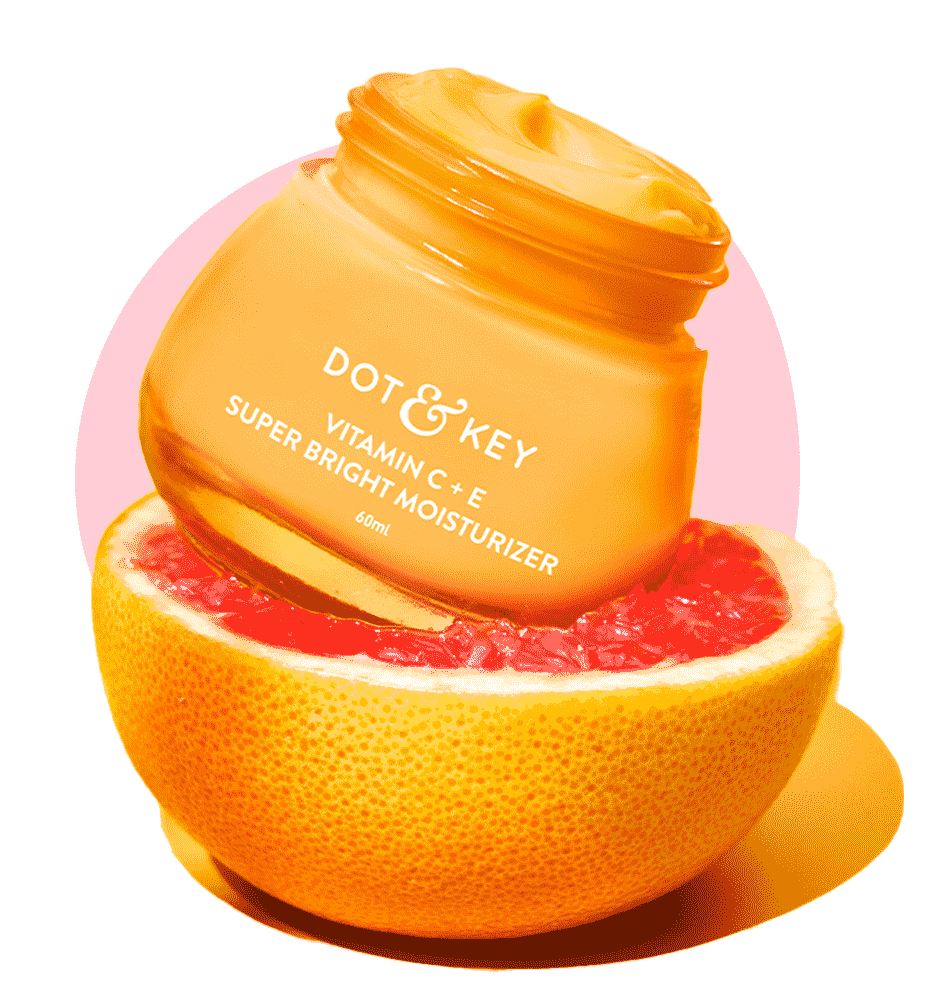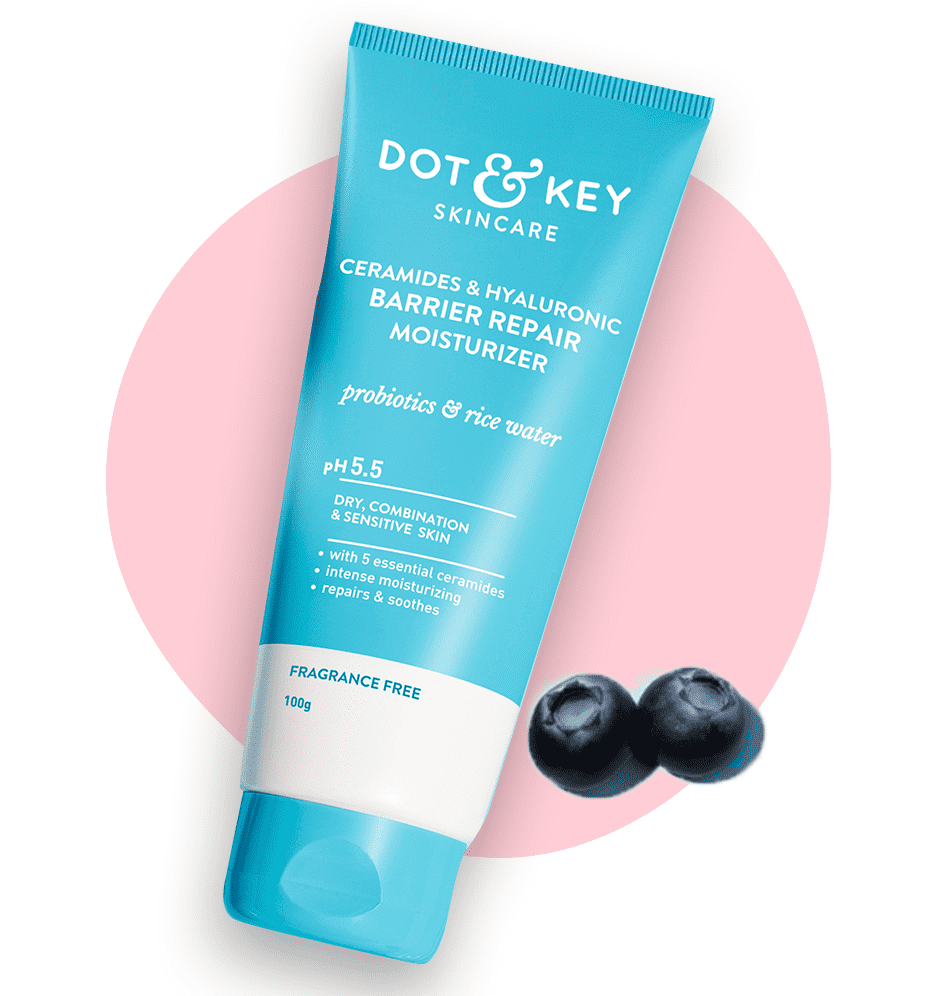
Overview
You must have heard about the largest organ of our body! Obviously, why not? It’s our skin. To keep it healthy, well-hydrated, blemish-free & glowing, you must moisturize your skin daily! No matter your skin type, moisturizer should be a must-have in your daily skincare routine. In this article, we will talk about ‘how moisturizers work’, ‘how to choose the right one’, & several benefits of moisturizers to keep your skin looking and feeling its best.
What is a Moisturizer?
A tall glass full of water for your skin!
Moisturizer is a topical skincare product in the form of cream, gel or lotion that acts as a protective barrier for your skin, keeping it hydrated and healthy. It is the cornerstone of a proper skincare routine. Moisturizer reinforces a healthy skin barrier & restores lost moisture in the outer layer of your skin. It keeps water in & irritants out. It reduces dryness, flaking, itching, dullness & dark spots while helping in healing and soothing skin.
Moisturizers can divided into several categories. However, the key ingredients that can help you choose the best moisturizer for your skin are:
- Occlusives: Occlusives act as a protective barrier that locks in moisture to prevent water loss from the skin. Ingredients that act as occlusives include beeswax, petrolatum, squalene, lanolin, etc.
- Humectants: Humectants attract moisture to the skin from the surroundings (when the humidity is higher) & from deeper skin layers. Common humectants are glycerin, hyaluronic acid, alpha-hydroxy acids (AHAs), salicylic acid, honey & urea.
- Emollients: Emollients are oily substances that fill gaps between skin cells, making the skin smooth and soft while preventing it from looking rough, dry, and flaky. They also have humectant or occlusive properties. Ceramides, Isopropyl palmitate, dimethicone, oleic acid, coconut oil, olive oil, shea butter, castor oil, & fatty acids are some well-known emollients.
Emollients and occlusives are heavier & add oil to the skin & help dry skin. Humectants are lightweight, non-oily, & provide weightless hydration.

Image Source: Harvard Health Publishing
Choose the right one or both, depending on your skin type
Active Ingredients:
Active ingredients in moisturizers do more than hydrate & prevent TEWL (trans epidermal water loss). They help improve your skin in specific ways, depending on your skin type & concerns you want to target.
You may already be familiar with active ingredients like:
Retinol (anti-ageing), Peptides (firming), Ceramides (barrier repair), Vitamin C (skin brightening), Antioxidants (checks free radicals damage), Benzoyl Peroxide (reduces acne), Salicylic Acid (unclog pores & blackheads), & Niacinamide (a do-it-all ingredient - fades dullness, dark spots, even out skin tone & texture, boosts glow, reduce blemishes).
Topical antioxidants:
Topical antioxidants in moisturizers help protect cells from damage caused by oxidation, which happens when chemicals react with oxygen and can be harmful. Common names are tocopherols, citric acid, butylated hydroxytoluene (BHT), tartaric acid, linoleic acid & ethylene-diamine-tetraacetic acid (EDTA).
Now that you know, next time when you buy moisturizer, check the ingredients list or flip the bottle or box to check the back panel where the moisturizer’s ingredients are listed.
How Moisturizers Work
Moisturizers work in two ways: either lock in moisture to keep it in your skin or add back moisture that’s been lost.
The outer skin layer has proteins & lipids that act as a natural protective barrier & fight against dryness, infections, stress, and irritants. When the skin barrier is damaged, it loses more water & causes several skin issues like eczema, acne, dark spots, etc.
Moisturizers help repair the skin barrier & keep it healthy by locking in moisture, smoothing rough patches, & preventing dryness & water loss. It helps:
- Improve skin hydration
- Maintain skin integrity
- Create a protective layer
- Repair the skin barrier
- Reduce dryness
- Improve skin elasticity
- Soften the skin
- Prevent water loss
- Improve skin's ability to retain & distribute moisture
- Reduce irritation, inflammation, & other skin issues
Moisturizers keep the skin hydrated, plump and healthy.
Benefits of Using a Moisturizer
"Do I really need to moisturize every day?" One of the frequently asked questions on Google. Before we answer, here are 2 questions: Do you drink enough water every day? Do you like soft, hydrated, glowing skin? If your answer is ‘Yes’, then the answer to the previous question is also ‘Yes’.
You should moisturize your skin daily & here’s why:
- Keeps skin hydrated: While skin naturally moisturizes under ideal conditions, city life & pollution can reduce this ability over time. Using moisturizers helps prevent dryness & flakiness, keeping your skin hydrated throughout the day, no matter the weather.
- Repairs Skin Barrier: Ingredients like ceramides & niacinamide strengthen & repair your damaged skin barrier by boosting natural lipids & reducing water loss & increasing the thickness of the outer layer of your skin. As a result, it significantly improves skin hydration, making it healthy.
- Prevention of Skin Conditions: Moisturizers help manage conditions like eczema, psoriasis, and dermatitis.
- Slows down ageing: Everyone wants to look young, but ageing is natural. Our skin loses elasticity as we age because collagen production slows down due to pollution, sun exposure, diet, and lifestyle. Skin becomes thinner and drier with less collagen, making wrinkles more noticeable. Moisturizers with retinol and peptides keep your skin hydrated, smooth out wrinkles, & make it soft, firm & youthful.
- Improves skin tone & texture: Using a daily moisturizer helps reduce dark spots & dullness & adds a natural glow to your skin. Moisturizers with vitamin C, watermelon, & pomegranate or a strobe cream with strawberry can brighten your skin and even out skin tones & texture.
Types of Moisturizers
Moisturizers can be divided into several categories: Formulation, skin concerns, skin types & ingredients. We already have talked about moisturizers based on the key ingredients & now we will focus on the formulation & common skin concerns.
Based on formulation:
- Lotions: Lotions have a thinner, lighter consistency than creams or ointments. They contain 70-80% water & 20-30% moisturizing ingredients, making them suitable for daytime use & layering. Lotions are best for "normal" skin types and can be applied to the body or face.
- Creams: More moisturizing and nourishing than lotions, creams have a thick, silky texture with a 50-50% water and moisturizing ingredient content. They are ideal for "normal" and "dry" skin types and nighttime use.
- Gels: Gel moisturizers are super lightweight & quick-absorbing. They are often water-based & tend to feel lighter on the skin than a lotion. Oil-free, non-sticky, & non-comedogenic gel moisturizers are suitable for oily skin types & are great for summer. They leave the skin feeling hydrated without any greasiness.
- Balms: Moisturizing balms are thicker than gels, creams, & lotions, with zero water content. They provide intense moisturization & nourishment, making them ideal for dry skin & are great for winter.
- Ointments: Ointments are heavier than creams & lotions, with more oil content & occlusives. They are effective for dry and flaky skin & address specific skin concerns.
Based on concerns:
- Anti-Aging: As we age, our skin tends to become thinner. Moisturizers with active ingredients like retinol & peptides can help improve skin texture & reduce fine lines & wrinkles, making skin look firm & youthful.
- Acne-Prone Skin: Excess oil, clogged pores, & comedogenic moisturizers can cause acne, blackheads, & skin irritations. Non-comedogenic moisturizers with salicylic acid, cica, or benzoyl peroxide help control excess oil, reduce acne, & unclog pores.
- Dullness & Dark spots: Dirt, pollution, & sun damage can make skin dull, tanned, & prone to dark spots. Active ingredients like Vitamin C, niacinamide, & watermelon can help fight dullness, reduce dark spots, and even out skin tone while boosting glow and radiance.
How to Choose the Right Moisturizer
Your skin type falls into one of five categories due to various genetic factors and diet. Knowing your skin type helps you choose the right moisturizer.
- Oily Skin: Lightweight, gel-based, oil-free, & non-comedogenic moisturizers.
- Dry Skin: A thick, emollient moisturizer or rich cream with occlusives or nourishing ingredients like ceramides.
- Normal Skin/Combination Skin: Lightweight, water-based moisturizer or lotions to hydrate skin without overloading oily areas.
- Sensitive Skin: Fragrance-free, mineral oil & harsh chemical-free moisturizers with soothing ingredients like Cica & Aloe Vera that are gentle on the skin.
Other factors to consider while choosing the right moisturizer:
- Climate: Lightweight or gel-based moisturizer for summer & nourishing & rich creams for winter.
- Skin Concerns: Choose the right moisturizer based on your skin concerns with active ingredients like Cica or Salicylic Acid for acne, Vitamin C for dullness & dark spots or Probiotics or ceramides for damaged skin barrier.
- Product Labels: Look for terms like non-comedogenic, mineral oil-free, sulphate-free, cruelty-free, hypoallergenic & clinically effective.
- Skin-friendly ingredients: Choose moisturizers with nourishing & gentle ingredients like Watermelon, Pomegranate, Sicilian blood orange, Blueberry, etc
- Patch Testing: Test new products in a small area to check for reactions.
How to Apply Moisturizer
Using moisturizers at the right time and in the right way is essential for getting the best results.
- Amount: A pea-sized amount for the face, & more for the body.
- Technique: Wash your hands & face, then apply a thin layer of moisturizer directly to your skin. Applying moisturizer on damp skin helps lock in moisture.
- Timing: AM & PM- Twice a day, daily! Once in the morning & once at night before bed.
- Layering: If you're using other products like spot cream, serums, or sunscreen, apply them in the correct order. Use a serum or spot cream first, then apply your moisturizer. While using sunscreen & makeup, apply moisturizer before that.
Common Myths and Misconceptions
- "Moisturisers Cause Oily Skin & Acne": It’s a common belief that moisturizers make skin oilier, but they help regulate oil production. Sometimes dry skin produces more oil that further leads to skin irritation & breakouts. A good moisturizer maintains the skin’s natural oil balance & hydration without causing greasiness. Choose oil-free or non-comedogenic moisturizers for oily skin to avoid clogged pores and breakouts.
- "Oily skin doesn’t need moisturizer": People often think oily skin doesn’t need moisturizer because it seems naturally hydrated. However, every skin type, including oily skin, needs moisturizer to keep skin healthy, protect the skin barrier, & prevent dehydration & irritations. Choose lightweight, non-comedogenic moisturizers for oily skin.
- "Expensive moisturizers are always better": People believe that expensive skincare means better hydration, but that's not always true. Effective hydration needs the right ingredients with proven results, not a big price tag. So look for products with effective actives like vitamin C, cica, retinol, ceramides, etc. that can address your skin concern while keeping your skin healthy & hydrated without breaking the bank.
- “All moisturisers provide the same level of hydration”: Moisturizers come in different formulas, so they don’t all provide the same level of hydration. Knowing your skin’s needs & types & choosing the right products with effective hydrating ingredients helps keep your skin well-moisturized and healthy.
- “Applying moisturiser once a day is sufficient”: We often think applying moisturizer in the morning is enough, but it doesn't last all day. You should also hydrate your skin at night, as that's when it repairs itself best. If you wash your face frequently, apply moisturizer after each wash.
- "Natural ingredients are always safer": Not all natural ingredients are suitable for every skin type. Understand your skin type, look for the right ingredients & moisturizers, read the ingredients list, & perform a patch test to ensure compatibility.
- “Hydration is only important in winter”: Hydration is needed all year round, not just in winter. Climate, pollution, dirt, air conditioning, & sun exposure can dry out your skin in any season. Keeping your skin hydrated consistently helps combat daily stressors that affect moisture levels.
Safety and Side Effects
Most moisturizers are safe and effective with no side effects however, here are a few precautions that you can take:
- Irritants, Harsh Chemicals & Allergens: Avoid products with known irritants, allergens & harsh chemicals like parabens, silicones, sulphates, phthalates, mineral oils, etc. or if you are allergic to any certain ingredients or actives.
- Side Effects: Discontinue using the moisturizer if you experience redness, itching, burning, stinging, or breakouts. Or if you have seen any unusual changes in your skin like turning white, soft, or soggy, consult the doctor right away.
- Photosensitivity & dark spots: Harsh fragrances, hydroxyl acids, and preservatives can make your skin more sensitive to sunlight, causing rashes & dark spots. If you have sensitive skin, look for non-comedogenic, fragrance-free moisturizers.
Expert Tips and Recommendations
Moisturize, Moisturize, Moisturize!
- Consistency: It can be tough to break bad habits & sometimes overwhelming to start good ones. All you need is consistency & a set routine.
- Follow the right way: We recommend doing it daily. Apply moisturizer on damp skin right after a shower or cleansing your face, to keep your skin from drying out. Apply moisturizer before sunscreen during the day and make it the last step in your nighttime skincare routine to help your skin recover.
- Holistic Approach: Make CSMS (Cleanser, Serum, Moisturizer, Sunscreen) your skincare SOS!
Integrate moisturizers in your skincare routine along with cleansing, sun protection, and specific treatments. Always use moisturizer, even if your skin feels oily or on acne days!
FAQs
Q: Can I use the same moisturizer year-round?
A: Skin needs may change with the seasons; lighter formulas for summer, richer ones for winter.
Q: How do I know if a moisturizer is working?
A: Your skin should feel hydrated, smooth, and comfortable without feeling greasy or tight.
Q: Can I use body moisturizer on my face?
A: Facial skin is more delicate; it's better to use products specifically formulated for the face.
Conclusion
No matter your skin type—dry, oily, normal, combination, or sensitive—moisturizer is key to your daily routine. It provides essential hydration and protection. Understanding your skin type, choosing the right moisturizer, and using it properly can keep your skin healthy and glowing.
References & Further Reading
- National Library of Medicine: Moisturizers
- American Academy of Dermatology Association: How to choose the right moisturizer
- Havard Health Publishing: How moisturizers work





















